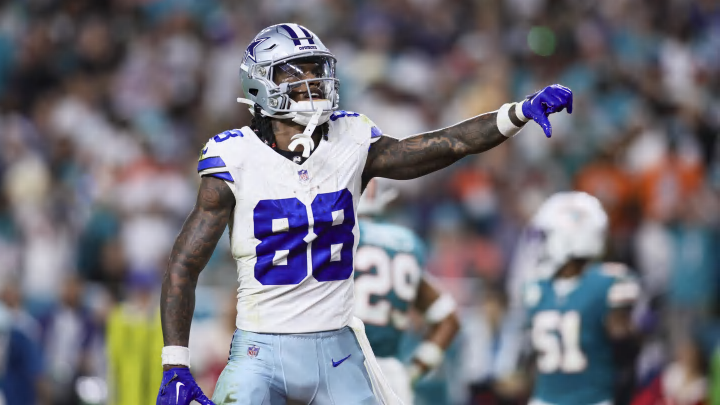The Cowboys Have CeeDee Lamb Signed, But They Don’t Seem to Have an Overall Plan

What timing. Just hours before Jerry Jones signed CeeDee Lamb to the second-largest receiver contract in NFL history, he proclaimed, in a rather profane interview with DLLS that nobody “could f------ come in here and do all the contracts … and be a GM any better than I can.”
It’s an interesting sentiment. We don’t have a sample size to compare another general manager with that kind of longevity. I have a lot of faith in humanity, so take what I’m about to say with a grain of salt, but I would imagine that most general managers, if given 27 years from 1997 to 2024, could have at least made it to one Super Bowl. Maybe I’m out of my depth. But anyway …
Jones’s prowess as a GM is exactly what we’re here to discuss, as it now takes center stage in a way that could have some serious global (in an NFL sense) consequences. Kudos to Jones for getting the deal done, though he waited to the point where Justin Jefferson’s contract acted like a top-heavy magnet for Lamb, dragging up any number Dallas’s All-Pro receiver could ultimately come up with. The Cowboys typically find themselves in a position where they either get a player at their price—I remember linebacker Jaylon Smith’s extension a few years ago as an example of a team-friendly contract—or the absolute top-of-the-market price. Rarely do we see anything in between, and we are now hurtling toward a free-agency period in which Dak Prescott could legitimately ask for more than $10 million above the current highest quarterback APY salary and get it from multiple desperate teams. Micah Parsons, who is extension eligible, is simply watching his bargaining power strengthen with every nonquarterback contract that gets signed in the coming weeks, months and years.
And so, this maelstrom creates a pair of really big questions that a general manager supposedly as good as Jones is needs to have an answer for.
First, is it possible to build a championship roster on which three players will command an unbelievably large amount of the salary cap but possibly not be in their primes together? All teams have good players, but few teams would be in a position where they’d have to field a competitive roster while paying the biggest quarterback contract in NFL history, the second-biggest wide receiver contract in NFL history and, when Parsons signs, the largest nonquarterback contract in NFL history.
The second big question for the general manager of this team: If the plan was always to arrive here—with Lamb signed, but Prescott and Parsons still in long-term limbo—then why hold onto everyone? Or, is the plan even to hold on to everyone? And if that’s in doubt, did Lamb know about this? Would it be valuable to have Lamb without Prescott, versus what Lamb would have fielded via trade? And so on, and so on. (OK, that was more than two questions.)
For a general manager as seasoned as Jones, there are likely myriad scenarios at play. But from where I’m sitting, I see two. The first is a team built around Prescott, Parsons and Lamb, which gives Jones a marketable club with a handful of affable spokesmen, but which is ultimately inflexible enough financially to sign the kind of veteran middle-class players that can push it over the edge. Similarly, the Cowboys would typically be drafting in that 15 to 25 range, which they would have to hope could produce at least two or three more players in the short term who could make this team competitive while Prescott, Parsons and Lamb are still young and effective.
The other scenario? The longer the Joneses wait to get these deals done, the more unlikely it makes some of them from becoming financially feasible. In this case, there is increasingly less time to make a trade that reaps the proper value, inching them closer to a scenario where, like the Carolina Panthers with Brian Burns, they miss out on the true return they could get for a generational talent.
Look around at the NFL and you’ll see these massive deals all being counterweighted in some form. The San Francisco 49ers can have eight players with a $9 million or more cap hit because their starting quarterback’s salary equates to less than 1% of the team’s total cap. The Minnesota Vikings can pay Justin Jefferson $35 million for (mostly) the same reasons. Between Sam Darnold and J.J. McCarthy, their cost at the position is less expensive by comparison. Likewise for the Chicago Bears and Montez Sweat, Keenan Allen and Tremaine Edmunds. The Kansas City Chiefs, while paying a quarterback and a defensive tackle monstrous salaries, have chosen other high-priced positions, such as receiver and cornerback, for which to save (or, in the case of center Creed Humphrey, get ahead on a long-term extension).
The Cowboys, meanwhile, are not really doing much balancing. They’re not skimping strategically, they’re not dealing for assets and they’re putting themselves in a position where the only option will be to continuously pay the highest prices in the NFL for a troika of players that, while excellent, have not yet advanced beyond the divisional round of the playoffs. They have a roster that is paying for the damages of previously signed top-of-market deals while preparing to sign another round of them. In the meantime, they are cash poor on the cap front and the crown jewels of their free agency class were not befitting of a club that has top-end Super Bowl aspirations in 2024.
A GM so good that no one can f------ come in here and do all the contracts … and be a GM any better—again, Jones’s words, not mine—understands that this is probably the most critical stretch of the franchise’s post-2000 history. Consider us all quite eager to see what he comes up with.
